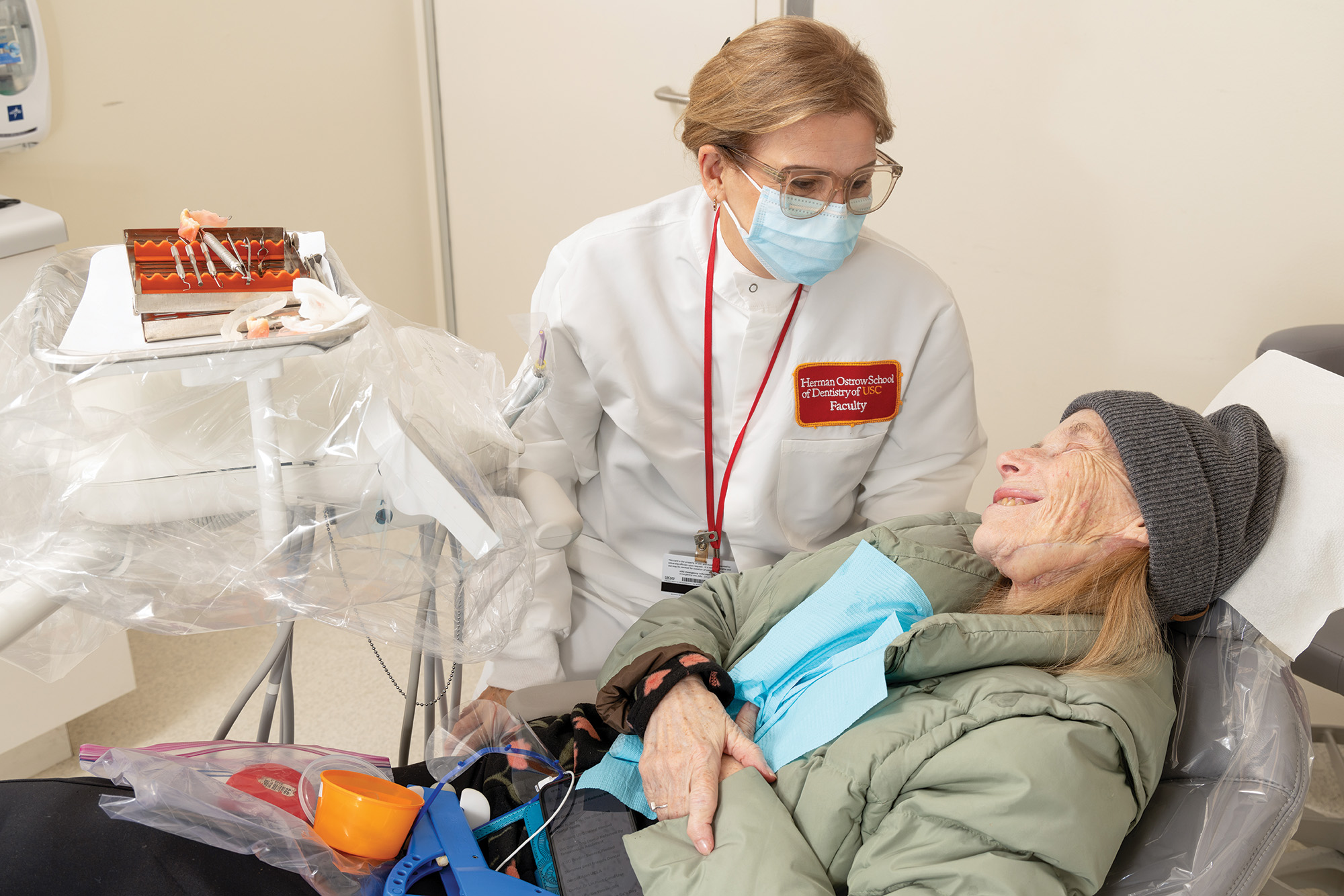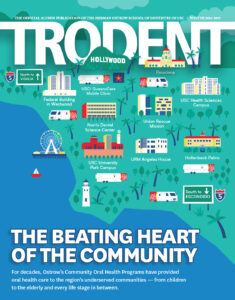
TRODENT COVER STORY (3 of 5)
A SPECIAL PLACE
The Dr. Roseann Mulligan Special Patients Clinic helps make oral health care accessible to those with intellectual and developmental disabilities, the frail elderly and medically complex patients, including those with HIV/AIDS.
BY ANDREW FAUGHT
FOR MEDICALLY COMPLEX PEOPLE — including those with intellectual and developmental disabilities, the frail elderly and those with HIV/AIDS — getting dental treatment is no sure thing.
“We are told over and over again, ‘I went to four different dentists, and no one wanted to touch me,’” says Piedad Suarez Durall MS ’18, director of Ostrow’s Dr. Roseann Mulligan Special Patients Clinic. “What’s different is, we treat our patients with compassion and invest time and patience in desensitizing methods after learning about their fears and working together to modify their behaviors.”
Opened in 1985, the on-campus clinic has grown from three to eight operatories, staffed by dental students (under faculty supervision) required to complete a week’s rotation as part of their studies at Ostrow. At its founding, the clinic was one of the first dental school-based programs of its kind.
The clinic treats about 1,000 patients every year, nearly half of whom have HIV/AIDS. Referred to Ostrow by the Keck School of Medicine of USC or various community clinics, these patients present with conditions common to poor oral health care: plaque, decay, periodontal diseases or teeth that need extraction.
HIV/AIDS patients have distinct challenges, as weakened immune systems make it harder to fight off infection. Additionally, many take multiple medications, causing dry mouth, which can place them at even higher risk for caries and periodontal diseases such as periodontitis and gingivitis.
The Importance of Respect
Many patients, particularly those with developmental disabilities or those who are frail and elderly, tire easily during treatment or become impatient. Suarez says the clinic fosters a friendly atmosphere, where students offer patients positive reinforcements during their time in the dental chair. The nurturing approach has made a difference.
“Successful treatment is sometimes as simple as taking the time,” Suarez says. “We respectfully explain procedures, talking directly to the patients, even though the caregiver or parent is in the room. The patients receive a lot of attention from the students, staff and faculty. This effort doesn’t go unnoticed. The majority of our patients tell us they love us as they leave their appointments. Some even offer a hug.”
Some dentists are reluctant to treat people with complex medical conditions due to the extra time needed to review patient medical histories, consult other medical professionals or consider the impact of mutiple medications on the oral cavity.
“While my goal is for students to see at least two patients per session, that can be difficult if the patient is extremely frail. Each pre-session requires students to thoroughly review multiple aspects of the patients to be seen during that session, including medical conditions, medications, treatment modifications and social determinants of health. This process can be time-consuming, but it ensures thorough patient care,” says Suarez, a professor of clinical dentistry who is also department chair of Geriatrics, Special Needs and Behavioral Sciences.
A Welcome Place
The clinic was founded by Associate Dean of Dental Public Health and Community Outreach Roseann Mulligan MS ’87. She created the facility after “it was clear to me that not everyone was receiving care,” Mulligan recalled in the Fall 2015 issue of TroDent. “I set about creating a clinic where people with disabilities could get that care and were welcome.”
Up to eight students at a time, under the supervision of Ostrow’s expert faculty members, perform everything from cleanings and restorations to extractions and prosthodontic care. In some cases, treatment included full-mouth extractions for patients whose teeth were too decayed to remain.
The clinic offers students exceptional learning opportunities that prepare them for serving diverse patient populations after graduation.
“Some students choose to pursue further study in caring for medically complex patients, and, as a result, go on to general practice residencies with a focus on special needs, Suarez says.
Health care has changed since the clinic first opened and, as a result, so has dental care, Suarez says. “People are living longer, sometimes after having undergone double organ transplants.”
Therein is a critical lesson that Suarez hopes her students take away from the clinical experience.
“Our students need to feel comfortable treating these special-needs patients, because they could be the only opportunity this individual has to receive dental care,” she says. “The future is now,” Suarez reminds her students. Modern health care, including oral health, is more interdisciplinary than ever.
“We can no longer focus on the oral cavity exclusively but need to consider the patient’s overall health, well-being and social factors as well and interact with other professions to provide the best treatment for each patient.”
Prevention remains a big part of the clinic’s approach: “We educate patients about oral hygiene, nutrition and evidence-based products that prevent caries and manage conditions like dry mouth. Using this approach, students learn that they can change patients’ lives.”

SPECIAL NEEDS PATIENTS
Treated at: Dr. Roseann Mulligan Special Patients Clinic and Hollenbeck-Palms
Fast facts:
▶ Patients with special needs have a significantly higher likelihood of experiencing dental problems due to factors like difficulty with oral hygiene practices, medication side effects and physical limitations.
▶ Between 50 and 70 percent of people with special needs have had negative experiences in trying to access dental care, according to some studies.
▶ In fact, 54 percent of dentists nationally do not treat patients with cognitive impairments and a poor ability to collaborate during treatment, according to the National Institutes of Health.
